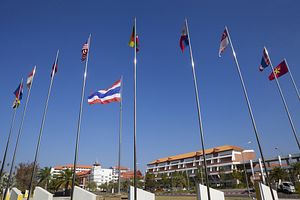There is mounting suspicion that the 10 members of the Association of Southeast Asian Nations (ASEAN) will miss their deadline to institute a single market as promised by the end of 2015.
That would result in several major setbacks, especially for authorities combatting human trafficking and dealing with labor migration.
The authorities had hoped the launch of the ASEAN Economic Community (AEC) would enable workers, particularly from poorer states, to find jobs more easily within ASEAN by removing many of the illicit practices used by middlemen and human traffickers.
This would also help eliminate press ganging by removing self-appointed agents responsible for visas and paperwork, and by providing workers with the right to join unions and access social security programs.
Cambodia program director for the U.S.-based labor group Solidarity Center, Dave Welsh, said that among the virtues of the AEC, forced migration (bordering on human trafficking), would largely disappear.
“There is an equal opportunity to seriously combat this problem with well-regulated job placement [rules] and administration from the government side, which could have a serious impact on eradicating worst practices in trafficking,” he said recently.
However, several problems have been cited as contributing to the AEC’s delays. Among them are the coup in Thailand, divisions within ASEAN over how to deal with China’s extraordinary territorial claims overlapping some of their maritime borders, cultural differences, and the harmonization of labor laws.
World Vision has also been prominent in combatting human trafficking. Since 2004 it has focused on six regional countries which signed the Coordinated Mekong Ministerial Initiative against Trafficking (COMMIT).
“It was never meant to be a static piece of paper,” Melissa Stewart, Australian-based senior legal advisor to World Vision said, adding that COMMIT had significantly improved information sharing at the departmental level between governments.
But she said a World Vision push to bring Brunei, Malaysia, Singapore, The Philippines and Indonesia inline with the COMMIT agenda ahead of the AEC launch would help enormously. She said it would also add some impetus when dealing with related issues like racism and gender bias, and how they influence human traffickers.
“We can’t deny the long history of racism,” she said. “Racial inequality and gender discrimination have made it ultimately acceptable to treat people differently.”
Welsh said any delays in instituting the AEC could undermine efforts to promote labor migration in an orderly and above board manner, but other problems would also emerge if the AEC was launched before it was ready.
“Particularly if the process is rushed in order to meet set deadlines before protections are properly in place for the most vulnerable. As more governments in countries which will be supplying workers to these jobs admit that they are not fully prepared for 2015, the likelihood is that there will be a rush to implement, increasing the likelihood of abuses.”
Among the most vulnerable would be domestic helpers and construction workers from Cambodia, Indonesia and the Philippines, Rohingya fishermen from Myanmar, plantation and garment workers from across ASEAN, and those who were promised legitimate jobs but instead found themselves trafficked in the sex industry.
Manuel Imson, Senior Program Officer for the International Labor Organization (ILO) in Bangkok, said to date governments had responded well by introducing regulations that cover licensing requirements, limiting agent fees and putting in place complaint mechanisms.
He added that many governments had mounted information campaigns against illegal recruitment.
“However, given that the supply of workers in lower wage countries far outstrips the demand, and that there are far more workers intending to work abroad than there are jobs, migrant workers are highly vulnerable to abuses during recruitment,” he said.
ASEAN’s future is highly dependent on the AEC, a single market and production base of 600 million people, in a region where human rights have often been overshadowed by economic growth and the push for industrialization.
Further delays to the AEC might be warranted given the need to promote an orderly and even start among the 10 ASEAN nations. However, key players are already mindful of the costs involved with delays, especially among Southeast Asia’s more vulnerable populations.
Luke Hunt can be followed on Twitter @lukeanthonyhunt

































